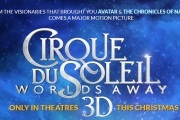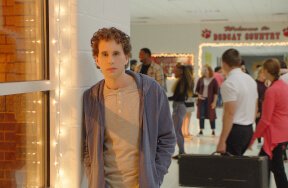By: Lynn Barker
Anne Hathaway, Hugh Jackman, Amanda Seyfried, Eddie Redmayne and Samantha Barks sing their hearts out in Les Misérables. If the title sounds like “miserable”, there’s a reason. The French title does represent the unhappy people in the film. The famous 1860’s novel by Victor Hugo, the popular musical and now the film focuses on injustice suffered by many of the characters.
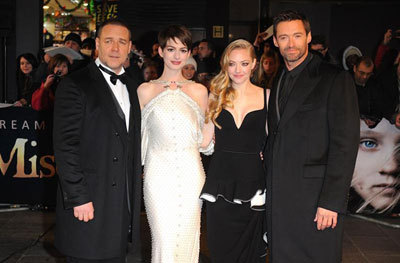 Russell, Anne, Amanda and Hugh at the London Premiere
Russell, Anne, Amanda and Hugh at the London Premiere
The characters and the actors playing them:
Jean Valjean - (a prisoner) Hugh Jackman
Javert – (his jailer) Russell Crowe
Fantine – (an unwed mother) Anne Hathaway
Cosette – (her grown daughter) Amanda Seyfried
Marius – (a young revolutionary in love with Cosette) – Eddie Redmayne
Eponine – (daughter of innkeepers, in love with Marius) Samantha Banks
We’re already familiar with Anne Hathaway’s very short haircut since the film. Kids wanted to ask her…
Q: Did you really cut your hair and are you sorry?
- Anne: I did cut my hair and I don’t feel sorry. I offered Tom (the director Tom Hooper) the option of cutting my hair (on camera). I always knew it was something I was willing to do for a character if it was the right thing to do. So, when I got cast and got the script, I knew they were keeping the hair cutting in. I’d read the book and it’s such a devastating scene in the book so I thought that doing it for real might raise the stakes a bit for the character. I thought they (the audience) are going to be with her feeling that alongside of her and, as an actor, it was great to authentically communicate a physical transformation.
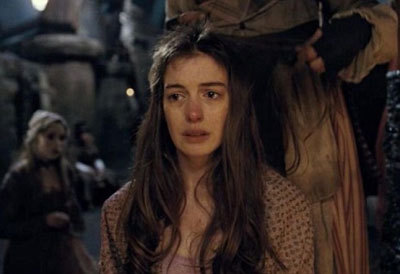 Anne as Fantine getting her hair cut
Anne as Fantine getting her hair cut
Q: Anne do you remember how you were inspired by some of the documentaries you watched on child slavery and the exploitation of women? (note: Fantine is fired from a factory job and has to turn to prostitution to feed her young daughter).
- Anne: I read things that are unimaginable. I remember there was a police raid on one of the brothels and a camera crew went along and there was a small crawl space up in the ceiling. Oh my God, 14 girls came out of it and they were all so tiny and crunched up and when they came out, they weren’t shocked that there was a camera there. They weren’t worried about getting arrested. They were gone. They were numb. They were unrecognizable as human beings and my heart broke for them.
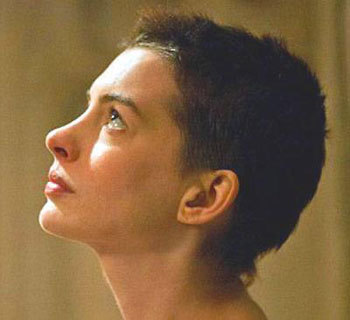 Anne as Fantine after haircut
Anne as Fantine after haircut
Q: When you sing in the movie, the audience hears the entire musical score. If you sang live on set, what were you listening to?
- Samantha: We all have an earpiece in our ears and we can hear the piano but the piano is in a box just off set. So, when we watch the film, we can see these big, sweeping orchestrations but actually all you can hear in your ear is a tiny, tinny piano. You have to use your imagination for sure to create these epic orchestrations. But it was funny because, if you don’t have the earpiece in we all look mad, like we’re just singing to nothing.
- Amanda: Did you ever forget that you were singing on set (all say “yes) because you only hear a tiny bit of this electric piano and it was such a strange experience. You’re singing your feelings and thoughts when you would normally be speaking them. It kind of goes away and all becomes one. In a way, it’s good that we didn’t hear the orchestra.
- Eddie: The unsung heroes of the film in some ways, were the two accompanists Roger and Jennifer because they had to play every single take flawlessly and with the most stunning sensitivity. They were extraordinary for us to work with.
 Amanda and Eddie as Cossette and Marius
Amanda and Eddie as Cossette and Marius
Q: Hugh, as a parent, how do you talk to your kids about a movie like this with so many poor, downtrodden characters in it? Do they know the importance and relevance to today’s world?
- Hugh: I have a 12-year-old and a 7-year-old and we’ve travelled to many places and sometimes with organizations like World Vision and the subject is natural for them. The kids (realize that) equality is the way the world was meant to be. We talk about contribution to community about giving back. I don’t know but the schools my kids are at, seems like they are way more connected to these issues than when I was young. I haven’t thought yet about my son seeing the movie. It may be, at times, a little too brutal but certainly the themes will resonate for sure.
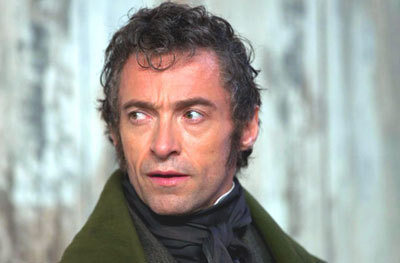 Hugh as Valjean in later years
Hugh as Valjean in later years
Q: Anne, there is a lot of crying in this movie and your director mentioned that you had practiced crying while singing. Also, Samantha, you had to sing with rain running down your face. Is there some secret to crying and singing at the same time?
- Anne: I don’t know that there are any secrets to it. It’s a pulse, a vein that you follow. In my case, there’s no way that I could relate to what my character was going through. I have had a very successful life and I don’t have any children that I could give up so what I did was try to get inside the reality of her story as it exists in our world.
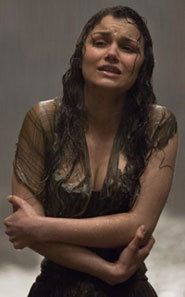 Samantha Barks as Eponine
Samantha Barks as Eponine
- To do that, as you know, I read a lot of articles and watched a lot of documentaries and news clips about sexual slavery. I came to the realization that I was thinking of Fantine as someone who lived in the past but she doesn’t. She’s living in New York City right now. She’s probably less than a block away. This injustice exists in our world so every day that I was her, I thought, ‘This is me honoring that this pain lives in this world’. And, I hope that, in all of our lifetimes, like today, we see it end.
- Eddie: And, from the student’s point of view, all the stuff that happens (in the film) at the barricade, all you had to do was open a contemporary newspaper to see equivalence happening, whether it was protests in New York or in the Middle East, this idea of young people lighting a flame to try an expose truths or pursue their own passions for a greater good. So, I think there was relevance across the board for us to tap into as actors.
- Samantha: For me, if there is rain pouring on your face and you’re crying and sniffley, you kind of have to leave your vocal vanity at the door a bit because, at first, you are thinking ‘Is it sounding nice? Is it sounding right?’ But I think that kind of realism in your voice adds to the emotion of that live singing, When you speak and you cry, you can hear it in someone’s voice. I think to be able to hear that when someone is singing adds to the emotion of it.
- Hugh: With Tom, we would rehearse full out. It wasn’t a half-hearted thing. Tom would (move his chair to a) very uncomfortably close place (laughter) and do this (leaning in) the whole way. So, by the time we got to the set, it was not uncomfortable having the camera that close. There had been times when I or Annie or all of us had done a version of the song where there was snot coming out of our noses and Tom would say ‘All right. That’s a little too much’ (laughter).
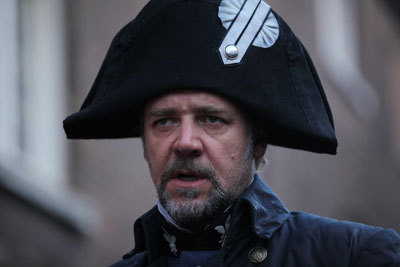 Russell Crowe as Javert
Russell Crowe as Javert
Q: Hugh, for beginning scenes didn’t you lose like 30 pounds to play the role? Did you feel tortured playing Jean Valjean?
- Hugh: Tom said ‘I want to make you unrecognizable and if people in your life aren’t saying you’re sick then something is wrong and we haven’t gone far enough’. So, I did lose a lot of weight and had the joy of putting weight on which was a 30 pound journey from the beginning but Anne here lost like 300 pounds in 14 days! (she laughs).
- I had my hair cut off with those gashes and Annie had been talking about cutting her hair. I remember Anne saying ‘If you end up cutting my scalp and there is blood, fantastic, let’s go for it’. I put up my hand and said ‘For the record, I would like make-up. Fake scars, please!’
 Hugh as prisoner Jean Valjean
Hugh as prisoner Jean Valjean
Q: How would you describe the Valjean character, Hugh?
- Hugh: He’s obviously one of the great literary characters and I see him as a real hero; quiet and humble. There has been such a great recent reminder of the New York City cop who bought shoes for the homeless man. To me Jean Valjean comes from a place of the greatest hardship that I could ever imagine. I don’t think any of us could. He manages to transform himself from the inside. Obviously, on film, we wanted to show the inside changes as well. It’s a spiritual change. It’s, to me, one of the most beautiful journeys ever written and I didn’t take the responsibility of playing the role lightly. I think it is one of the greatest opportunities I’ve ever had and if I’m a tenth of the man Jean Valjean is, I’ll be a very happy man.
 Samantha Barks as Eponine
Samantha Barks as Eponine
Q: One of the most powerful lyrics in the film is ‘to love another person is to see the face of God’ and I wanted your personal takes on that.
- Amanda: It’s the most profound thing that you could ever hear someone say and I think for it to be a song is just that much more powerful. It’s what we’re left with at the end and I think that’s why Les Mis has been such a phenomenon for so many years because of the themes, what it’s about in the end is love.
- Samantha: That theme of redemption and hope is there. (My character) Eponine who’s never really experienced good people, when she meets someone like Marius, he’s a good man and that has an effect on her. At the end, she does do the right thing because I think love has actually redeemed her. Although her ending is tragic, she does do the right thing.
- Hugh: The first thing you have to do is be present, know what you stand for in life and face what is in front of you and, as Annie reminded me, that’s that cop in Time’s Square, the humanity of just seeing what was required. That’s real love and that’s probably, according to Victor Hugo, and I agree with him, the answer to life. I think you hit right on it with that question. Thank you.
 Amanda and Eddie
Amanda and Eddie
Q: Can you talk about the camaraderie among the cast? Did you get anything to commemorate it, like tattoos like the “Lord of the Rings” cast did? (laughter)
- Anne: We were next to like eight tattoo parlors last night. Honestly the person who I think was the beginning of the glue we wound up developing isn’t even here and that was Russell (Crowe). You can not underestimate Russell’s contribution and influence on this cast. He was the first one to say ‘Hey, come to my house Friday night. My voice teacher is gonna play piano. We’ll have a couple of drinks and sing’. That was such a key part of the process. I think it really cemented the bond between us. Now we kind of say we’re ‘Camp Les Mis’.
- Samantha: Russell was so passionate about music. That was so exciting for us. There was something new about this to all of us and there is this link that bonded us all together and that’s our shared passion for music. I think (at Russell’s) we sang a duet from “Rent” and we sang an Adele song backward and forward. It made us all so comfortable with each other. It was singing in this group of people that weren’t judging you. Just communicating and sharing this bond of music was cool.
- Eddie: The process felt so new. The extraordinary thing about this project was none of us really knew what we were doing. It was this wonderful mixture of the theater world and film world meeting together in a process that felt unique and original to all of us. None of us knew the right answer. We were literally asking each other for advice and never really feeling that we’d found the answer. We were constantly aspiring to do the best we can because we are fans ourselves.
- Anne: I think it can’t be understated that we are all massive Les Mis geeks. I think we were all slightly worried that this is not really happening that we were all on some strange mutual trip and were all hallucinating. But we were all such fans of it that I think we all showed up on the first day with enormous gratitude that the responsibility of telling the story was entrusted to us.
 The Posters featuring Anne, Hugh, and Amanda
The Posters featuring Anne, Hugh, and Amanda




























